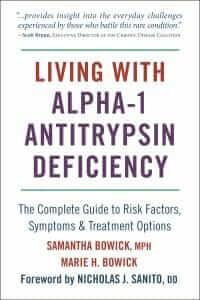What is alpha-1 antitrypsin deficiency (A1AD)? Author Samantha Bowick has written articles revolving around important questions and information about A1AD. She also wrote Living with Alpha-1 Antitrypsin Deficiency with her mom Marie Bowick, who is an A1AD patient. Their new book, coming out August 27, 2019, offers the most up-to-date information on this illness.
The Alpha-1 Antitrypsin Deficiency Survival Guide
More than 100,000 individuals in the U.S. suffer with alpha-1 antitrypsin deficiency (A1AD), a rare genetic, incurable disease which causes the liver to not produce a certain protein which protects and keeps the lungs functional. What do you do if you’re diagnosed? How about long-term?
Understand Your Diagnosis. Take a step back and evaluate where your body is. It is important to understand your body, A1AD, augmentation therapy, and life style changes. Research all of your options. Do not let your doctor pressure you into any treatments you are not 100% on board with.
Form a Team. You cannot do it alone. From physicians to family, it takes teamwork and specialists to put A1AD on the defense. Having support is crucial in fighting this illness. On days when we don’t feel like pushing to find answers anymore, those supportive people in our lives keep us going. It is also important that you feel like your doctor is listening to you. If you don’t feel this way, it may be time to find a new doctor. Connecting with others who also suffer with A1AD can be extremely helpful because they understand and can relate more of what you are going through, and validate how you’re feeling without making you feel judged. This can be a great tool for coping.
Research, Research, Research. Did I mention research? Researching A1AD and everything that comes with the illness is crucial. Books, such as Living with Alpha-1 Antitrypsin Deficiency, as well as websites and support groups are just a few research tools available for those who suffer with A1AD.
Know Your Medications and Treatment Options. There are several different types of medications that doctors may prescribe to try to combat symptoms related to A1AD: augmentation therapy, inhalers, nebulizer medications, antibiotics, anti-inflammatories, as well as others.
Keep a List of Your Symptoms. Keeping a list of the symptoms you are/have been experiencing can help you and your doctor determine what is going on and the best course of action. It can also help you remember what to tell your doctor during your appointment as doctor appointments can be overwhelming and cause anxiety. Also, keeping track of your oxygen saturation level can be helpful to determine if it is regular or irregular as pulmonologists usually check this at appointments.
Know Risk Factors for Other Diseases. Unfortunately, A1AD can also come with comorbidities, or other diseases. These include, but are not limited to: chronic obstructive pulmonary disease (COPD), emphysema, asthma, bronchitis, influenza, and pneumonia. Make sure you know about these in case they come up while suffering with A1AD or breathing difficulties.
Be Kind to Yourself: This is important! When you don’t feel well, remember it is okay to take time for yourself, whether it’s to sleep/rest, take a relaxing bath, or turn down plans because you don’t feel well. Other people may not understand, but that’s okay. They may not know or exactly get what you are going through, but it is important for you to take care of your body however you think you need to.
Decrease Stress. It is hard to not feel too stressed, but it is important for those who suffer with breathing illnesses to try and decrease their stress as much as possible as added stress can impact breathing. Light exercise (if you are up to it), yoga, reading, writing, and coloring are just a few things you can do to try to relax and have a release.
Stay Mentally Positive. One of the hardest parts of A1AD is not being able to do the activities you once could. This can lead to self-doubt, depression, stress, and anxiety. It is important to stay as positive as possible for your health.
Stay Committed. Improving your health and daily life requires an unwavering commitment to the principles and tenets we lay out in detail inside Living with Alpha-1 Antitrypsin Deficiency. The most important factor in putting A1AD on the defense is to make a commitment to finding answers if you haven’t already and do everything in your power to stay as healthy as possible. It’s important to remember everybody is different and something that works for you may not work for someone else.
For more articles and information on A1AD, please click here.

Samantha Bowick has a Master of Public Health degree from Liberty University. She received a Bachelor of Science degree in Health Care Administration at Columbia Southern University. She is devoted to using her education and experiences to advocate for women who suffer with endometriosis and other chronic illnesses. She is the author of Living with Endometriosis. She currently lives in Aiken, South Carolina.
Marie H. Bowick has lived in Aiken, South Carolina her entire life, and was diagnosed with A1AD at 46 years old. She has been married for 27 years and is the mother of two daughters. She worked in manufacturing for 15 years and then became a caregiver to her mother, father, and youngest brother.





